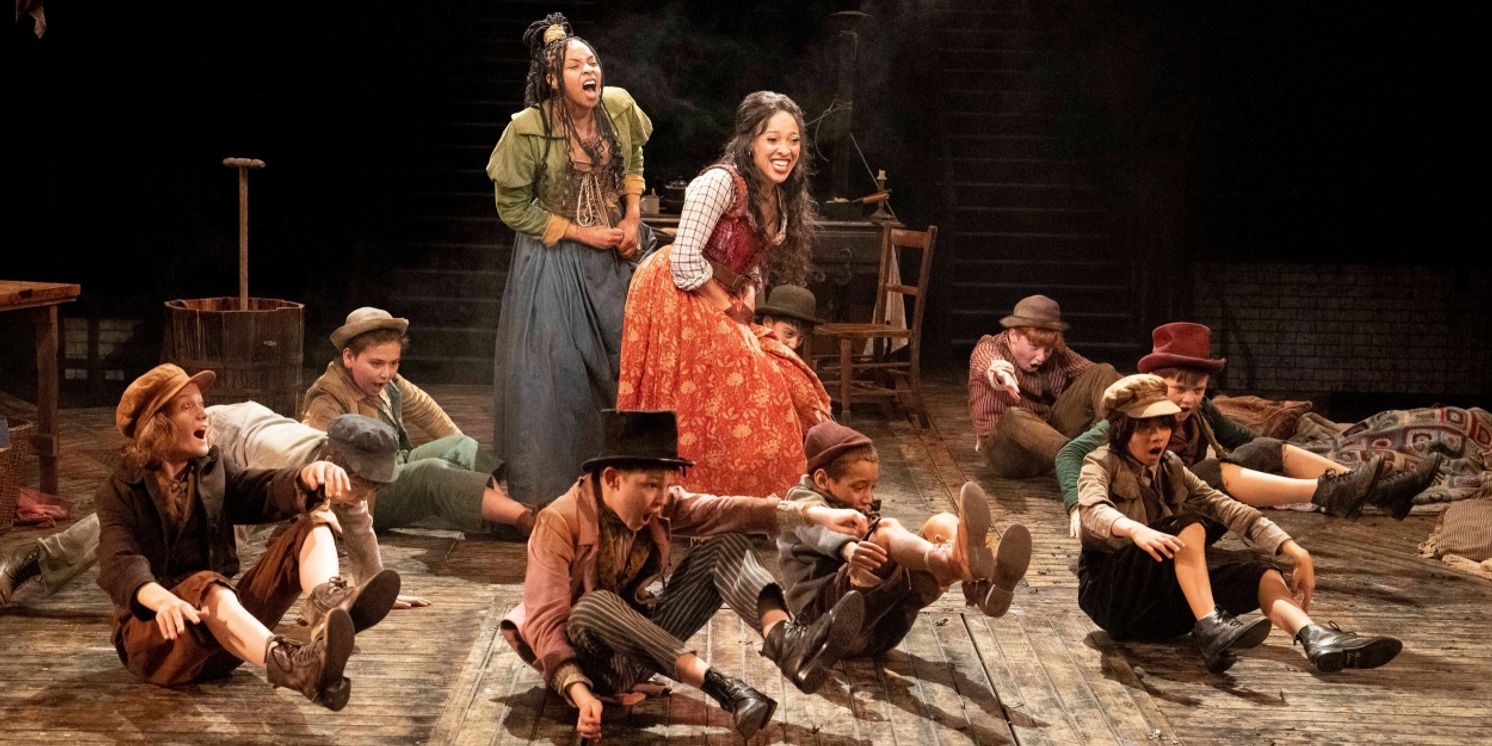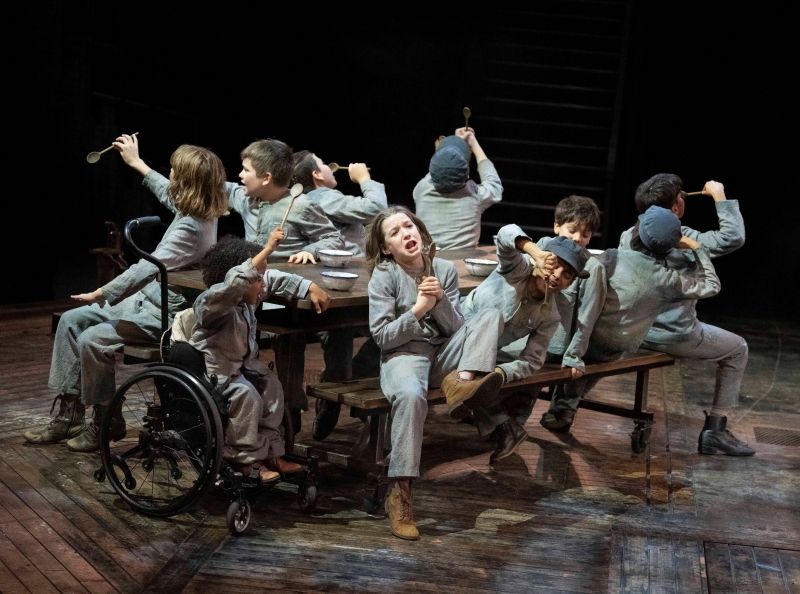Review: OLIVER!, Leeds Playhouse
Lionel Bart's classic revived in joyous West End standard production

 Like many parents and grandparents who will take along kids to this production, I cannot remember a time when I did not know the songs. That speaks to a lost world when three television channels provided Christmas entertainment. Carol Reed’s film seems an odd choice for afternoon festive viewing now, but times were different then. Lionel Bart’s hook after hook tunes, sparkling rhymes and Ron Moody’s prancing comedy and Oliver Reed’s seething menace wedged them forever in the synapses. For that gift, we must consider ourselves fortunate indeed.
Like many parents and grandparents who will take along kids to this production, I cannot remember a time when I did not know the songs. That speaks to a lost world when three television channels provided Christmas entertainment. Carol Reed’s film seems an odd choice for afternoon festive viewing now, but times were different then. Lionel Bart’s hook after hook tunes, sparkling rhymes and Ron Moody’s prancing comedy and Oliver Reed’s seething menace wedged them forever in the synapses. For that gift, we must consider ourselves fortunate indeed.
Oliver! is as much loved now as then and meeting those expectations is just one of the problems staging the show in 2023 presents. It’s a highwire act that can topple at the drop of a hat, well, yamulke perhaps, as Fagin was soaked in Dickens’ antisemitism in the novel, which was not entirely expunged by Bart, himself an East End Jew, 122 years later in 1960. There’s an indication or two of Fagin’s ethnicity in this production (the music screams its wonderful heritage, so how could there not be?) but you would have to go looking for offence to find any in James Brining’s ever-so-slightly anodyne show.
So let’s deal with that too. It’s no surprise to learn that “Sikes and Nancy” was an audience favourite on the author’s lucrative reading tours - there’s always a queue for the Ghost Train after all. Sensibilities change and though we see the violence in Sikes (Chris Bennett as bullet-headed and muscle-bound as Sikes’ dog, Bullseye), the extreme evil is offstage and reported in. That’s all but inevitable these days, but it does diminish the terror that such a man engendered, even in his erstwhile mentor and current fence, Fagin.
Quibbles, no more, in a show that succeeds in so much else.

Carter-J Murphy, one of three pre-teens who play the eponymous hero in rotation, was my Oliver and he was tremendous. Nailing his big number, “Where Is Love” was expected - a thousand or so kids auditioning from all over Northern England is going to turn up a few strong boy sopranos - but the Quarry Stage is a vast space to control as the focal point of so much of the action. Murphy does that, relaxing into the transformative trajectory of the orphan who eventually does find the love he craves.
Maybe it’s the sheer vivacity of the opening number, “Food, Glorious Food” that has always had me thinking that it’s physical deprivation that drives the pathos that underpins the narrative. Oliver Twist is hungry, all the workhouse kids are hungry, and Fagin frets about the oncoming infirmity of old age. But, in “Consider Yourself” it’s obvious that it’s emotional deprivation that has all but eaten Oliver’s soul (it did for Bill Sikes) - the sustenance that The Artful Dodger (Hughie Higginson, another wonderfully cast child actor) provides is more than the apple he tosses to his new recruit. It’s underlined by Steve Furst’s Fagin, a father-figure who knows each of his pickpockets’ names and wishes them to “Be Back Soon” as much for their companionship as their loot. He’s still something of a villain if not a creep, but a largely benign one who generates sympathy in the house - who else is going to care about these kids?
Choreographer, Lucy Hind, has the urchins marching above and across the space for that first act closer and does a fine job with the chorus in the big ensemble numbers. There’s enough room for the dancing to release the joy in Bart’s music but we never lose sight of the dark, dingy attics and alleys in which much of the action takes place, full of hiding places for ne’er-do-wells and sites for murders, unseen and unreported.
Jenny Fitzpatrick provides the contrast, reminding us that we’re in a big space set out in the round, as she delivers out her 11 o’clock number “As Long As He Needs Me”, in which Nancy finds justification for staying with the monstrous Sikes and, less obviously, shows us how the instant bond arose between herself and Oliver, both aching for love no matter how flawed its source. As ever when belting is enhanced by mics, I found it a little overdone, but one could feel the emotion in the seats around me, so her commitment got its reward.
Everyone will have their favourite song (mine, “Who Will Buy” inevitably lacked the epic scale of the film version, a peak moment in 20th century cinema, but more than acceptable here) and they provide an all but unbreakable commercial and artistic spine to any production. That said, there are traps in the show for a 21st century director and, aside from the purist objections above of a Dickens fan like me, this show tip-toes through them successfully without ever losing the edge that acts as a shield against the traditional charge of sentimentality. For what it's worth, I’d characterise Dickens as a socialist in a time and place without a wellspring of revolutionary spirit, so he confined himself to critiquing his society and shaming the haves into doing more for the have-nots. And, lest we forget, making serious money.
Not that you have to take such weighty thoughts with you into the Yorkshire night. You’re more likely to be tapping a toe, humming a tune and thinking that musical theatre can make for a fine, fine life - at least until you turn on the heating back home and contemplate its cost. But such was the joy that filled Leeds Playhouse for a precious three hours, you’ll be sure to hurry up and be back soon.
Oliver! is at Leeds Playhouse until 27 January 2024
Photo Credits: Alastair Muir
Reader Reviews
Videos

